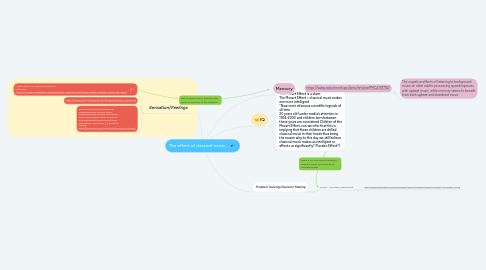The effect of classical music...
by Madelyn Norstrem


1. Sensation/Feelings
1.1. Music's Effects on Cognitive Function of the Elderly https://www.psychologytoday.com/blog/memory-medic/201504/musics-effects-cognitive-function-the-elderly
1.2. https://www.bcps.org/students/spotlight/cseluzicki/FINAL-PAPER.pdf
1.3. The cognitive effects of listening to background music on older adults: processing speed improves with upbeat music, while memory seems to benefit from both upbeat and downbeat music Sara Bottiroli, Alessia Rosi, [...], and Elena Cavallini https://www.ncbi.nlm.nih.gov/pmc/articles/PMC4197792/
2. Problem Solving/Decision Making
2.1. Source 1: The Other Mozart Effect
2.1.1. http://search.proquest.com/iimp/docview/1576255/C9F9BC5066614773PQ/2?accountid=12706
3. IQ
3.1. The Mozart Effect is a sham The Mozart Effect = classical music makes one more intelligent “Now most infamous scientific legends of all time 20 years old (under media’s attention in 1994-2000 and children born between these years are considered Children of the Mozart Effect, can we infer that this is implying that these children are drilled classical music in their heads thus being the reason why to this day we still believe classical music makes us intelligent or affects us significantly? Placebo Effect?)
4. Memory
4.1. https://www.ncbi.nlm.nih.gov/pmc/articles/PMC4197792/
4.1.1. The cognitive effects of listening to background music on older adults: processing speed improves with upbeat music, while memory seems to benefit from both upbeat and downbeat music

